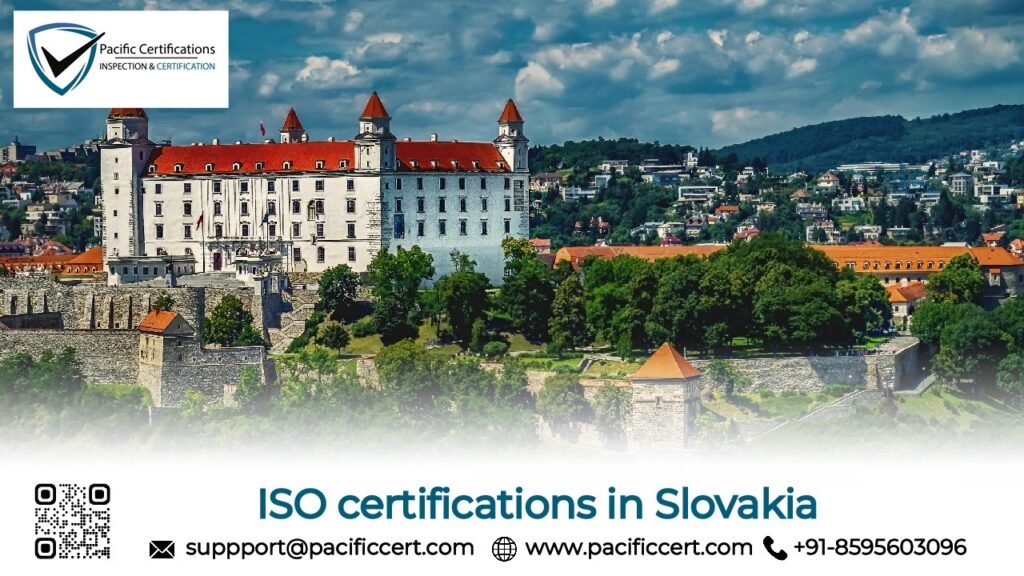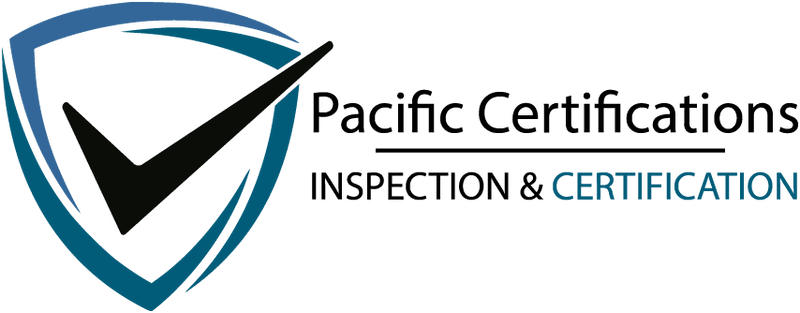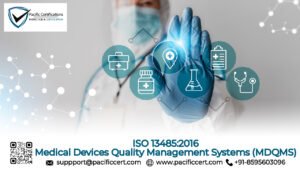
ISO Certifications in Slovakia and How Pacific Certifications can help
Slovakia operates within a framework that values quality, safety, environmental responsibility and efficiency. ISO standards play a crucial role in ensuring that organizations within the country adhere to international benchmarks, which not only boost their competitiveness but also foster trust among consumers and regulatory bodies. The adoption of ISO standards in Slovakia reflects the country’s commitment to maintaining high standards across various industries, from manufacturing to services.
ISO standards provide a systematic approach for organizations to manage their processes, improve efficiency, ensure customer satisfaction and comply with regulatory requirements. In Slovakia, the implementation of ISO standards is increasingly seen as a strategic tool to enhance business performance and open up new markets.
Looking to elevate your business standards with ISO certification in Slovakia? Reach out to us today at support@pacificcert.com or call +91-8595603096. We’re here to assist you!
Popular ISO Standards in Slovakia
Several ISO standards are particularly popular and widely adopted by organizations in Slovakia. These standards cover a broad range of operational areas, ensuring that businesses can meet both national and international expectations. The following are some of the most commonly implemented ISO standards in Slovakia:
- ISO 9001: Quality Management System (QMS): ISO 9001 is the most widely recognized and implemented quality management standard in Slovakia. It provides a framework for businesses to ensure consistent quality in their products and services, enhance customer satisfaction, and streamline operations.
- ISO 14001: Environmental Management System (EMS): ISO 14001 helps organizations minimize their environmental footprint, comply with legal obligations and demonstrate their commitment to environmental stewardship.
- ISO 45001: Occupational Health and Safety Management System (OHSMS): ISO 45001 provides a structured approach to managing occupational health and safety risks, reducing workplace incidents, and fostering a safe working environment.
- ISO 27001: Information Security Management System (ISMS): ISO 27001 standard helps organizations protect their information assets, manage risks related to information security, and ensure compliance with data protection regulations.
- ISO 22000: Food Safety Management System (FSMS): ISO 22000 outlines the requirements for a food safety management system, helping businesses manage food safety hazards, ensure the safety of their products and comply with legal and regulatory requirements.
Click here to find out more applicable standards to your industry
Ready to achieve ISO certification for your business in Slovakia? Contact us at support@pacificcert.com or give us a call at +91-8595603096. Let’s take your business to the next level.
Market News
This year, Slovakia has seen a growing trend in the adoption of ISO standards, particularly in response to increasing regulatory requirements and consumer expectations. Research indicates that the demand for ISO 27001 certification has surged, driven by the need for robust information security measures amidst rising cyber threats. Additionally, the adoption of ISO 14001 continues to grow as companies align their operations with the European Union’s stringent environmental regulations.
Market analysis suggests that businesses in Slovakia are increasingly viewing ISO certifications not just as a compliance requirement but as a strategic asset that can enhance their competitiveness in both local and international markets. The trend towards digital transformation has also spurred interest in ISO standards related to information technology and cybersecurity, reflecting the country’s broader efforts to become a leader in the digital economy.
For expert guidance on ISO certification in Slovakia, email us at support@pacificcert.com or call +91-8595603096. We’re here to support your certification journey!
How We Can Help
At Pacific Certifications, we understand the importance of ISO certifications in ensuring your business meets international standards. We are a certification body dedicated to helping organizations in Slovakia achieve ISO certification. Our role is to conduct audits and issue certifications based on your organization’s adherence to the relevant ISO standards.
It is important to note that we do not provide consultancy services, gap analysis, training, or implementation. Our focus is purely on the audit and certification process, ensuring that the certification we issue is impartial, credible, and internationally recognized. We work with a diverse range of industries in Slovakia, providing certification services that help businesses enhance their operations & meet regulatory requirements.
Take the first step towards ISO certification in Slovakia by contacting us at support@pacificcert.com or calling +91-8595603096. Your business deserves the best!
Requirements of ISO Certifications in Slovakia
The requirements for each ISO standard are tailored to address specific aspects of an organization’s operations. Below are the key requirements:
ISO 9001: Quality Management System (QMS)
- Context of the Organization: Understanding the internal and external factors that can affect the organization’s ability to achieve its objectives.
- Leadership and Commitment: Top management must demonstrate leadership and commitment to the QMS, establishing quality policies and objectives.
- Planning: Organizations must identify risks and opportunities, establish quality objectives, and plan actions to address them.
- Support: This includes providing resources, ensuring competence, raising awareness, and maintaining effective communication. It also involves the proper management of documented information.
- Operation: Planning and controlling the processes necessary to meet customer requirements, including design, production, and delivery of products or services.
- Performance Evaluation: Monitoring, measuring, analyzing, and evaluating the QMS to ensure it meets the intended outcomes. This includes internal audits and management reviews.
- Improvement: Identifying and implementing opportunities for continuous improvement, including corrective actions to address non-conformities.
ISO 14001: Environmental Management System (EMS)
- Environmental Policy: The organization must establish, implement, and maintain an environmental policy that reflects its commitment to environmental protection.
- Environmental Aspects: Identifying the environmental aspects of the organization’s activities, products, and services, and determining their significant impacts on the environment.
- Compliance Obligations: Understanding and ensuring compliance with applicable legal and regulatory requirements related to environmental management.
- Environmental Objectives and Planning: Establishing environmental objectives and planning actions to achieve them. This includes identifying risks and opportunities and integrating them into the EMS.
- Resource Management: Ensuring that resources, including human resources and specialized skills, are available to establish, implement, maintain, and improve the EMS.
- Operational Control: Planning and controlling processes related to significant environmental aspects, including the use of resources, waste management, and emissions control.
- Performance Evaluation: Monitoring, measuring, analyzing, and evaluating environmental performance, including conducting internal audits and management reviews.
- Continual Improvement: Enhancing the organization’s environmental performance by identifying and implementing improvements.
ISO 45001: Occupational Health and Safety Management System (OHSMS)
- OH&S Policy: Establishing, implementing, and maintaining an OH&S policy that demonstrates the organization’s commitment to a safe and healthy workplace.
- Hazard Identification and Risk Assessment: Identifying workplace hazards, assessing risks, and determining necessary controls to eliminate or minimize risks.
- Legal and Other Requirements: Identifying and ensuring compliance with applicable legal and regulatory requirements related to OH&S.
- Objectives and Planning: Setting OH&S objectives and planning actions to achieve them, considering the organization’s risks and opportunities.
- Support and Resources: Ensuring the availability of resources, competence, and awareness necessary to implement and maintain the OHSMS. This includes communication and documentation.
- Operational Control: Implementing and maintaining processes to manage OH&S risks, including emergency preparedness and response.
- Performance Evaluation: Monitoring, measuring, analyzing, and evaluating OH&S performance, including conducting internal audits and management reviews.
- Improvement: Continually improving the OHSMS by identifying non-conformities, taking corrective actions, and enhancing overall performance.
ISO 27001: Information Security Management System (ISMS)
- Information Security Policy: Establishing an information security policy that reflects the organization’s commitment to protecting its information assets.
- Risk Assessment and Treatment: Identifying information security risks, assessing their potential impact, and implementing appropriate risk treatment measures.
- Legal and Regulatory Requirements: Ensuring compliance with applicable legal, regulatory, and contractual requirements related to information security.
- Information Security Objectives: Setting and achieving objectives that are aligned with the organization’s overall business strategy and information security needs.
- Support and Resources: Providing the necessary resources, competence, and awareness to implement and maintain the ISMS. This includes communication, training, and documentation.
- Operational Control: Implementing controls to manage information security risks, including access control, incident management, and business continuity planning.
- Performance Evaluation: Monitoring, measuring, analyzing, and evaluating the performance of the ISMS, including conducting internal audits and management reviews.
- Improvement: Continuously improving the ISMS by addressing non-conformities, implementing corrective actions, and enhancing information security practices.
These requirements provide a structured approach for organizations to achieve and maintain ISO certification. Implementing these requirements helps organizations comply with regulations and also drives continual improvement and enhances overall business performance.
Need ISO certification in Slovakia? Contact our team at support@pacificcert.com or +91-8595603096 for reliable certification services tailored to your business needs.
Benefits of ISO Certifications in Slovakia
Implementing ISO standards brings a wide array of benefits to organizations. Below are the key benefits of each of the specified ISO standards.
- ISO 9001 helps organizations improve the quality of their products and services, leading to higher customer satisfaction and reduced complaints.
- Streamlining processes and eliminating waste through ISO standards lead to improved operational efficiency, cost savings, and better resource utilization.
- ISO certifications are recognized internationally, enabling organizations to compete more effectively in global markets.
- ISO 14001 helps organizations identify and manage their environmental aspects, leading to reduced pollution, waste, and resource consumption.
- The standards ensures that organizations meet legal and regulatory requirements.
- ISO 45001 helps organizations identify and mitigate workplace hazards, reducing the incidence of work-related injuries, illnesses, and fatalities.
- ISO 27001 helps organizations protect their information assets from threats such as data breaches, cyber-attacks, and unauthorized access.
- ISO 22000 provides a systematic approach to identifying and controlling food safety hazards, ensuring the safety of food products throughout the supply chain.
Each of these ISO standards offers substantial benefits that go beyond mere compliance. They help organizations in Slovakia and globally to improve their operations and achieve sustainable growth. Implementing these standards is a strategic decision that can lead to long-term success.
For ISO certification in Slovakia, contact us today at support@pacificcert.com or +91-8595603096. Let’s work together to achieve your business goals!
Who Needs ISO Certifications in Slovakia?
ISO certifications are beneficial for a wide range of organizations across various industries in Slovakia. The following types of organizations can particularly benefit from obtaining ISO certification:
- Manufacturing Companies: ISO standards like ISO 9001 and ISO 14001 are widely adopted in the manufacturing sector to ensure product quality, environmental responsibility, and operational efficiency.
- Service Providers: Service-based organizations, including IT services, financial services, and professional services, can benefit from ISO certifications like ISO 9001 and ISO 27001 to enhance service quality and information security.
- Food Industry: Organizations involved in the food industry, including food processing, packaging, and distribution, should consider ISO 22000 certification to ensure food safety and compliance with regulatory requirements.
- Construction and Engineering Firms: ISO standards such as ISO 45001 are particularly relevant for construction and engineering firms to manage occupational health and safety risks and ensure safe working conditions.
- Healthcare Providers: ISO standards like ISO 9001 and ISO 13485 (for medical devices) are important for healthcare providers to ensure the quality and safety of their services and products.
- Environmental Management Companies: Organizations involved in waste management, recycling, and other environmental services can benefit from ISO 14001 certification to demonstrate their commitment to environmental sustainability.
- Public Sector Organizations: Government agencies and public sector organizations can adopt ISO standards to improve service delivery, enhance transparency, and ensure compliance with regulatory requirements.
Certification Process for ISO Standards in Slovakia
The process of achieving ISO certification in Slovakia involves several key steps. At Pacific Certifications, we guide organizations through this process to ensure a smooth and successful certification journey:
- Gap Analysis (Optional, but not provided by us): Before beginning the certification process, some organizations choose to conduct a gap analysis to identify areas where they may not meet the requirements of the relevant ISO standard.
- Preparation and Documentation: Your organization needs to prepare the necessary documentation that outlines your processes, procedures, and policies in line with the ISO standard.
- Internal Audit: Conducting an internal audit is a crucial step in the certification process. This audit helps you identify any non-conformities or areas for improvement before the external audit is conducted.
- Certification Audit: The certification process involves a two-stage audit conducted by us at Pacific Certifications:
- Stage 1 – Documentation Review: We review your organization’s documentation to ensure it meets the requirements of the ISO standard.
- Stage 2 – On-site Audit: We conduct an on-site audit to assess the implementation of your management system, verify compliance with the standard, and identify any non-conformities.
- Corrective Actions: If any non-conformities are identified during the audit, your organization will need to take corrective actions to address them. Once these actions are implemented, we will verify their effectiveness.
- Certification Decision: After a successful audit and the completion of any required corrective actions, we will issue your organization’s ISO certification. This certification is valid for a specified period of three years.
- Surveillance Audits: To maintain your certification, we will conduct periodic surveillance audits to ensure that your organization continues to comply with the ISO standard.
- Recertification: At the end of the certification period, your organization will need to undergo a recertification audit to renew the ISO certification.
Achieving ISO certification is a critical step towards enhancing your organization’s operations, and improving customer satisfaction. At Pacific Certifications, we are committed to helping organizations in Slovakia achieve ISO certification through our rigorous audit and certification process.
Pacific Certifications is accredited by ABIS, in case you need support with ISO certification for your business in Slovakia, please contact us at support@pacificcert.com or +91-8595603096.
We look forward to helping you achieve your ISO certification goals!
FAQs: ISO Certifications in Slovakia
ISO certification is a formal recognition that an organization’s management system, process, or product conforms to the requirements of an international standard developed by the International Organization for Standardization (ISO). It is important because it demonstrates a commitment to quality, safety, and efficiency, enhances customer confidence, and opens up new business opportunities.
The time required to achieve ISO certification can vary depending on the complexity of your organization, the specific ISO standard, and your level of preparedness. On average, the process can take anywhere from a few months to a year.
Yes, any organization, regardless of size or industry, can apply for ISO certification. The key is to ensure that your organization’s processes and systems align with the requirements of the relevant ISO standard.
The cost of ISO certification varies depending on factors such as the size of your organization, the complexity of your operations, and the specific ISO standard. For an accurate quote, it is best to contact us directly.
ISO certifications typically need to be renewed every three years. During this period, your organization will also need to undergo annual surveillance audits to maintain the certification.
If non-conformities are identified during the audit, your organization will have the opportunity to take corrective actions to address these issues. Once the corrective actions are implemented and verified, the certification process can proceed.
Yes, ISO certification can be a powerful marketing tool that enhances your organization’s credibility and reputation. It can help you meet the requirements of customers and regulatory bodies, opening up new business opportunities, particularly in international markets.
While hiring a consultant is not mandatory, some organizations choose to work with consultants to help them prepare for certification. However, it’s important to note that at Pacific Certifications, we only provide audit and certification services, not consultancy.
To maintain your ISO certification, you will need to undergo regular surveillance audits, typically conducted annually. Additionally, your organization must continually improve its management system and ensure ongoing compliance with the ISO standard.
Losing ISO certification can impact your organization’s reputation and credibility, potentially leading to a loss of business opportunities. It may also result in non-compliance with regulatory requirements, depending on your industry.
Read More at: Blogs by Pacific Certifications








